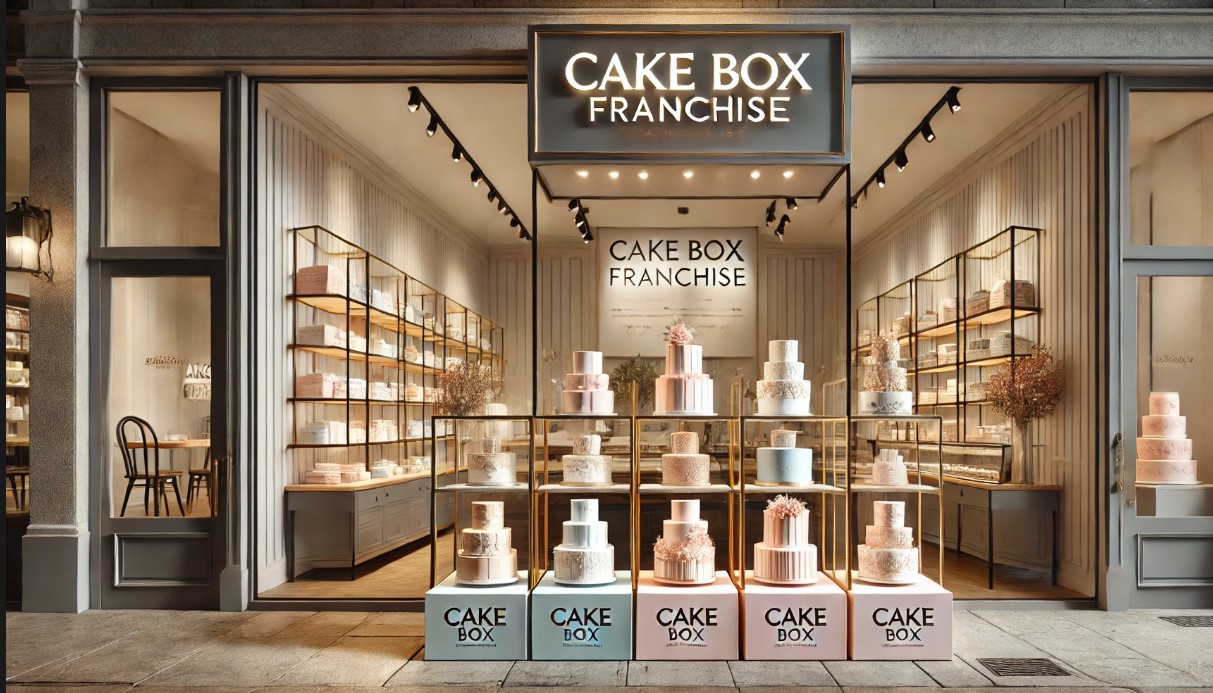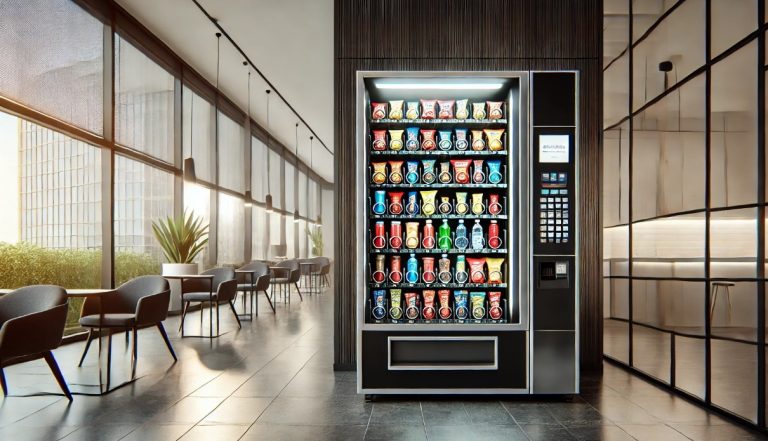Cake Box Franchise Cost: How Much Does It Take to Start in the UK?
Starting a franchise can be an excellent way to enter the business world with an established brand and a proven business model. If you are considering investing in the Cake Box franchise, you are looking at an opportunity that combines a unique product offering with a growing market.
Cake Box specialises in egg-free, vegetarian fresh cream cakes, catering to a broad customer base, including those with dietary restrictions and religious preferences. Since its establishment in 2008, the company has rapidly expanded across the UK, becoming one of the leading brands in the bakery industry.
However, before making an investment, it is essential to understand the Cake Box franchise cost, expected profitability, and the overall business model . This guide will cover everything you need to know, from startup expenses and ongoing costs to franchise benefits and application procedures.
What Is Cake Box?

Image – Source
Cake Box is a UK-based bakery franchise that offers handmade, fresh cream cakes without eggs. Founded in East London in 2008, the business quickly gained popularity for its ability to provide high-quality cakes on demand, making it a favourite among customers looking for last-minute celebration cakes.
The brand has grown significantly, with over 215+ franchise stores nationwide and a goal of reaching 400 locations. Unlike many traditional bakeries that require customers to pre-order custom cakes, Cake Box provides a “pick a cake and personalise it on the spot” service, making it highly convenient for busy customers.
The success of Cake Box is largely attributed to its consistent product quality, customer service, and strong brand identity. By maintaining high standards and a well-defined business model, the franchise continues to expand across the UK.
Why Is Cake Box a Popular Franchise in the UK?
Cake Box has positioned itself as one of the most successful bakery franchises in the UK, thanks to its innovative approach to cake production and customer service. The franchise has several standout features that contribute to its popularity.
One of the biggest selling points is its egg-free concept, which caters to vegetarians, those with egg allergies, and communities that follow religious dietary laws. This has given Cake Box a competitive advantage over traditional bakeries, as it fills a niche market with high demand.
Additionally, Cake Box’s ready-to-go celebration cakes eliminate the need for advance orders, making it easier for customers to purchase cakes for last-minute events. This business model increases foot traffic and boosts sales, ensuring steady revenue for franchise owners.
The brand’s expansion is also supported by strong marketing efforts, with Cake Box investing in advertising, social media campaigns, and customer engagement programs to maintain its market presence.
With a proven track record, strong brand recognition, and increasing demand, Cake Box offers an appealing opportunity for entrepreneurs looking to enter the bakery industry.
How Much Does It Cost to Start a Cake Box Franchise?

Image – Source
Starting a Cake Box franchise requires a significant investment, but it also provides the advantage of operating under a well-established brand. The total cost includes several components, from the franchise fee to store setup and operational expenses.
Initial Investment
The Cake Box franchise fee is £19,950 + VAT. This fee grants franchisees the right to use the Cake Box brand, receive training, and access business support services.
Apart from the franchise fee, setting up a Cake Box store requires an additional investment of approximately £90,000 – £120,000, which includes:
- Shop lease and setup (interior design, branding, and necessary renovations)
- Equipment and machinery for cake production and storage
- Initial stock and ingredients for cake preparation
- Legal and administrative expenses
Ongoing Costs
Once the store is operational, franchisees must cover ongoing expenses, which include:
- Royalty fees, which are a percentage of monthly revenue paid to Cake Box
- Marketing and advertising fees, which contribute to national and regional promotional efforts
- Operational costs, such as rent, utilities, staff salaries, and insurance
- Equipment maintenance and store upkeep
Additionally, franchisees may need to cover additional training costs for new employees and regulatory compliance costs to meet food safety standards.
How Profitable Is a Cake Box Franchise in the UK?
Profitability is one of the most crucial aspects to consider before investing in a franchise. Cake Box has a strong financial model that allows franchisees to generate consistent revenue and profit margins.
Revenue and Profit Margins
On average, a Cake Box franchise generates an annual revenue of £250,000 – £400,000, depending on location, customer demand, and operational efficiency. The gross profit margin typically ranges between 50% – 60%, making it a highly profitable business.
Break-Even Period
Most Cake Box franchisees break even within 12 – 24 months, meaning they recover their initial investment within this period. Factors influencing profitability include store location, competition, and marketing efforts.
What Is the Process of Applying for a Cake Box Franchise?
Cake Box has a structured franchise application process to ensure that only suitable investors become franchise owners.
Step-by-Step Application Process
- Submit an Application: Interested candidates fill out an application form on Cake Box’s official website.
- Attend a Presentation Meeting: Prospective franchisees visit the Cake Box Head Office for an informational session.
- Secure a Location & Pay a Deposit: After approval, applicants reserve a shop location.
- Business Planning & Funding: Franchisees develop a business plan and secure financing if needed.
- Store Setup & Training: The Cake Box team designs and fits out the store while the franchisee undergoes training.
- Grand Opening: After all preparations, the store officially opens with Cake Box’s support team assisting in the launch.
Cake Box only allows sole traders, meaning partnerships are not permitted. However, applicants do not need prior baking experience, as full training is provided.
What Funding Options Are Available for Cake Box Franchisees?
Cake Box understands that not all prospective franchisees have the full capital available upfront. As a result, they recommend funding 50% of the investment with personal savings and securing the remaining 50% through bank loans.
Cake Box has strong ties with various UK banks that provide business loans tailored to franchise investments. Additionally, some franchisees may be eligible for government grants or financial aid for small businesses.
Franchisees are advised to consult with Cake Box’s Financial Director, who can provide guidance on securing funding and managing financial planning.
Is Investing in a Cake Box Franchise Worth It?

Image – Source
A Cake Box franchise is a solid business opportunity for those looking to enter the food industry with an established and reputable brand.
While the initial investment is significant, the potential profit margins and steady demand make it a worthwhile venture.
Key Investment Factors
| Factor | Details |
| Franchise Fee | £19,950 + VAT |
| Store Setup Costs | £90,000 – £120,000 |
| Annual Revenue | £250,000 – £400,000 |
| Profit Margins | 50% – 60% |
| Break-even Period | 12 – 24 months |
Cake Box provides comprehensive support, training, and a structured franchise model, making it an ideal choice for entrepreneurs seeking a profitable and scalable business.
What Training and Support Do Cake Box Franchisees Receive?
One of the key benefits of investing in a Cake Box franchise is the comprehensive training and ongoing support provided by the company.
Unlike starting an independent bakery, where entrepreneurs must figure out operations, marketing, and customer service on their own, Cake Box ensures that its franchisees are well-equipped to run their stores successfully.
Initial Training Programme
Before opening a store, franchisees undergo a three-week intensive training programme at Cake Box’s Head Office Training Academy in Enfield or at a designated Centre of Excellence.
The training covers:
- Business operations and management: Understanding the Cake Box business model, daily operations, and customer service strategies.
- Product preparation: Learning how to handle and assemble cakes using Cake Box’s proprietary methods (since the cakes are delivered as pre-baked sponge bases).
- Marketing and branding: Techniques to attract customers, promote products, and maintain a strong brand presence.
- POS system training: Learning how to use Cake Box’s sales and inventory management system.
Support After Store Opening
Once the store opens, franchisees continue to receive dedicated support from Cake Box’s Training and Sales team, ensuring a smooth transition into operations. During the first few weeks, a Training Manager and Sales & Support Manager are assigned to help oversee business setup, troubleshoot challenges, and guide franchisees on best practices.
Beyond the initial opening, Cake Box provides regular training updates and workshops to keep franchisees informed about new product launches, market trends, and operational improvements. Franchisees also participate in Franchise Forums every two months, where they receive updates on business strategies, marketing campaigns, and industry insights.
With a well-structured training programme and continuous support, Cake Box ensures that even individuals with no prior baking or business experience can successfully run a store and achieve profitability.
What Challenges Do Cake Box Franchise Owners Face?
While Cake Box offers a strong business model and brand recognition, every franchise comes with its challenges. Understanding these potential difficulties can help prospective franchisees make informed decisions before investing.
Initial Investment and Financial Management
One of the primary challenges of opening a Cake Box franchise is the high initial investment. With startup costs ranging from £90,000 – £120,000, prospective franchisees must have significant capital or secure financing.
Even after breaking even (which typically happens within 12–24 months), careful financial planning is needed to maintain profitability and cover operational expenses.
Competitive Market Conditions
The bakery industry in the UK is competitive, with many independent bakeries and supermarket chains offering cakes and desserts. While Cake Box’s egg-free niche sets it apart, franchisees in areas with high competition may need to invest more in local marketing, promotions, and customer engagement to attract repeat business.
Meeting Operational Standards
Since Cake Box operates under a franchise model, all franchisees must follow strict business guidelines and quality control measures. While this ensures consistency across all stores, it may feel restrictive for some business owners who prefer greater flexibility in operations.
Staff Recruitment and Retention
Hiring and retaining skilled employees can be challenging, especially in high-demand areas where bakery staff or cake decorators are in short supply. Franchisees must ensure that employees are well-trained and motivated to maintain high-quality customer service.
Adapting to Business Growth
While Cake Box provides initial training and support, franchisees must be prepared to adapt and scale their business as customer demand increases. Managing higher sales volumes, expanding delivery options, and introducing new products require continuous effort and strategic decision-making.
Despite these challenges, Cake Box’s proven franchise model, extensive support, and strong brand recognition help franchisees overcome obstacles and achieve long-term success. By carefully planning their investment, managing finances effectively, and following Cake Box’s business strategies, franchise owners can build a thriving and profitable bakery business.
Conclusion
Investing in a Cake Box franchise is a promising opportunity for individuals looking to enter the food and bakery industry. With its unique egg-free concept, strong brand presence, and high profitability, Cake Box continues to expand across the UK.
If you are interested in becoming a Cake Box franchisee, visit Cake Box and apply today to take the first step toward owning your own high street cake shop!
FAQs
How much does it cost to start a Cake Box franchise?
The estimated Cake Box franchise cost ranges from £90,000 – £120,000, including the franchise fee of £19,950 + VAT.
What are the ongoing expenses for Cake Box franchisees?
Ongoing costs include royalty fees, marketing contributions, staff wages, rent, and operational expenses.
How long does it take to break even?
Most franchisees break even within 12 – 24 months, depending on location and performance.
Do I need experience in baking or business management?
No, Cake Box provides full training and support, so no prior experience is required.
Can I open a Cake Box franchise as a partnership?
No, Cake Box only allows sole traders to operate their franchises.
What makes Cake Box different from other bakery franchises?
Cake Box’s egg-free concept, high brand trust, and strong franchise network make it stand out in the UK market.







